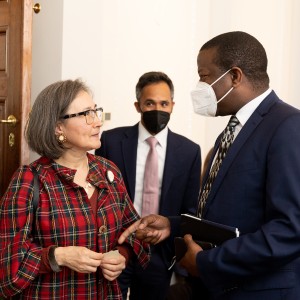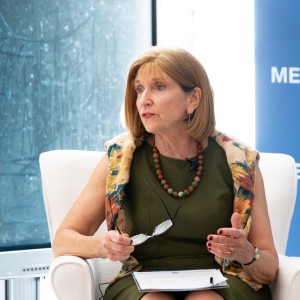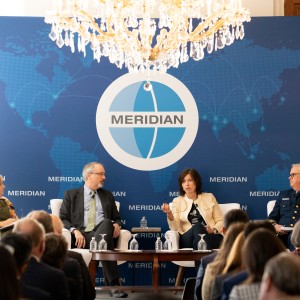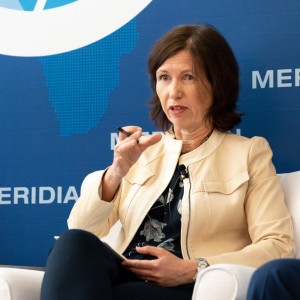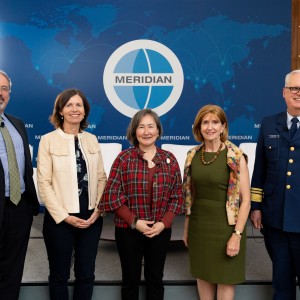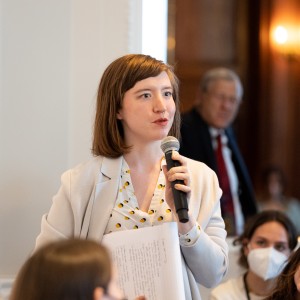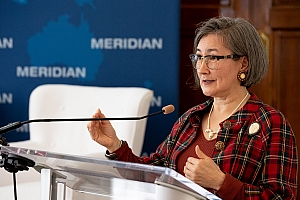Breaking the Ice: The Emerging Landscape for Arctic Diplomacy
The 2022 Meridian Diplomacy Forum explored international relations and the shifting global order in the three areas of limited sovereignty: the Ocean, the Arctic, and Space. The following session centered around Arctic diplomacy.
Eroding coastlines, thawing permafrost, and disappearing sea ice in the Arctic are giving way to new shipping routes and greater access to ports as well as oil, gas, and critical minerals. Conversely, the longtime spirit of cooperation and peace among some Arctic governments is growing increasingly frosty. Many nations, including the United States, are turning to their militaries and making bellicose moves to safeguard their interests in the region and forecast their ambitions. This session explored how the U.S. Arctic Policy can balance the Biden Administration’s increasing environmental and anti-climate change agenda on one hand with important security and economic interests on the other. It also made the case for expanding science diplomacy, while showcasing successful applications of economic and public diplomacy.
Featured Speaker: Ms. Lisa Koperqualuk, Vice-President (International), Inuit Circumpolar Council – Canada
Panelist: Vice Admiral Scott Buschman, Deputy Commandant for Operations, U.S. Coast Guard
Panelist: James DeHart, U.S. Coordinator for the Arctic Region, U.S. Department of State
Panelist: Her Excellency Anniken Krutnes, Ambassador of Norway to the United States
Moderator: Ambassador Paula Dobriansky, Senior Fellow, Harvard University Belfer Center for Science & International Affairs; Vice Chair, Atlantic Council Scowcroft Center
Here are some top takeaways from the Arctic session:
1. "WHAT HAPPENS IN THE ARCTIC DOESN’T STAY IN THE ARCTIC”
Environmental changes in the Arctic, largely linked to climate change, are having ripple effects and global implications. Rising temperatures which result in melting ice continues to cause sea level rise, challenging the way of life for island nations and others across the globe, including the Global South. The international community is working to map the landscape, establish policy and norms, and foster cooperation in the Arctic. As conditions in the Arctic shift, the role of the U.S. Coast Guard and other actors continue to evolve, as highlighted by Vice Admiral Scott Buschman. For example, the U.S. Coast Guard has had to transition to a mobile presence in the Arctic to best adapt to changing conditions. The Arctic’s changing conditions are having an impact beyond the region, as the international community continues to grapple with the evolving landscape.
2. ARCTIC EXCEPTIONALISM HAS DISSOLVED
The recent geopolitical conflicts in Eurasia have caused a ripple effect across nations and international bodies that regularly collaborate with Russia. There has been a historic standard of “Arctic Exceptionalism,” which dictates that despite other geopolitical ongoings, the Arctic remains an area of cooperation among actors. The conflict in Ukraine has drastically changed everything. The Arctic Council is on a hiatus as Russia is currently serving as Chair. Ambassador Krutnes is hopeful that the body will resume as soon as possible. It is important to continue to work together, citing “the challenges we have as the Arctic Council don’t disappear.” Norway takes over the chairmanship of the Arctic Council in 2023.
3. AN INCLUSIVE INTERNATIONAL BODY
The Inuit Circumpolar Council (ICC) is a multinational NGO that represents the 180,000 Inuit, Yupik, and Chukchi peoples across Alaska, Canada, Greenland, and Chukotka (Russia). It is one of six Indigenous Peoples’ organizations to have Permanent Participant status on the Arctic Council. This allows indigenous populations are able to exercise their right of self-determination, while simultaneously providing valuable insight based on “direct, multigenerational, and extensive experience.” The Inuit were traditionally a marine people, Lisa Koperqualuk highlighted, whose lives were and are “inextricably linked to the ability to move freely over the landscape.” Today, the ICC is an important stakeholder in the Arctic Council as it gives Indigenous people a voice in ongoing political dialogue and research. Part of the strength of the ICC can be attributed to speaking with united voice on issues of common concern and combining “energy and talent to protect and promote our way of life.”
4. LAND OF ECONOMIC OPPORTUNITY?
The Arctic is home to several minerals such as coal, iron ore, and other precious metals. As such, there is growing interest in the area from nations beyond the region. Ambassador Krutnes remarked on the importance of striking a balance between green policies in the Arctic and continued economic development. The State Department’s Jim DeHart highlighted how over time cooperation has been maintained while simultaneously remaining cognizant of security concerns in the region, particularly with regards to external geopolitical tensions involving states such as Russia and China. High priorities in the Arctic remain revitalizing that cooperation, encouraging high standards, and preparing for a region that will “transform dramatically in the next 10-20 years,” concluded Mr. DeHart.
5. GOVERNANCE IN THE ARCTIC
The Arctic has been framed by some international actors as an “ungoverned space of untapped resources up for grabs,” explained Mr. DeHart. The Arctic is, however, fundamentally regulated by the Law of the Sea, and is not an ungoverned space. Ambassador Krutnes, Ms. Koperqualuk, and Mr. DeHart all highlighted the importance of continued international governance in the Arctic, including by bodies such as the Arctic Council. Crafting Arctic policy based on available data, such as that collected by the U.S. Coast Guard, continues to be a high priority item, especially for Arctic states and groups. The Arctic remains largely uncharted, and as ice continues to melt, sea levels continue to rise, and the area is further contested, it will be even more important to maintain and promote international cooperation and collaboration in the region.
Project summary
| Breaking the Ice: The Emerging Landscape for Arctic Diplomacy | April 2022 | |
|---|---|
| Regions: | Europe and Eurasia |
| Impact Areas: | Energy and the Environment, Foreign Policy, Public Diplomacy |
| Program Areas: | Diplomatic Engagement |
